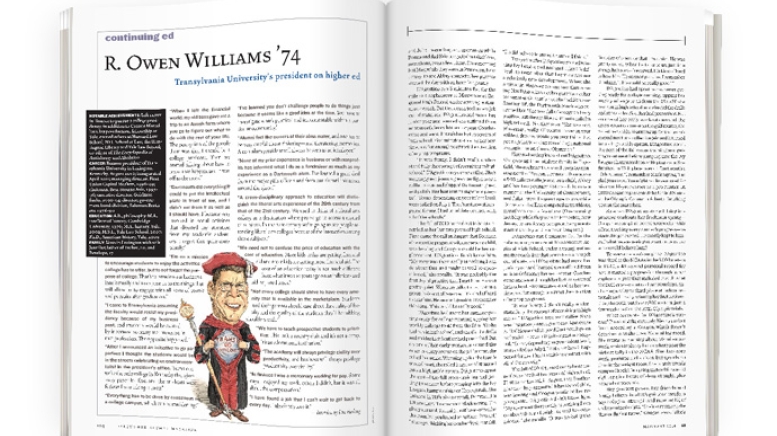Notable Achievements: Left career in finance to pursue a college presidency; in addition to Cassius Marcellus Clay postdoctoral fellowship at Yale, earned others at Harvard Law School, NYU School of Law, the Huntington Library and Yale Law School; co-editor of The Encyclopedia of Antislavery and Abolition
Career: Became president of Transylvania University in Lexington, Kentucky, August 2010; inaugurated April 2011; managing director, First Union Capital Markets, 1996-99; chairman, Bear Stearns Asia, 1995-96; executive director, Goldman Sachs, 1990-94; director, government bond division, Salomon Brothers, 1976-90
Education: A.B., philosophy; M.A., intellectual history, Cambridge University, 1976; M.A., history, Yale, 2002; M.S.L., Yale Law School, 2007; Ph.D., American history, Yale, 2009
Family: Lives in Lexington with wife Jennifer; father of Tucker, 20, and Penelope, 17
“When I left the financial world, my old boss gave me a trip to an Amish farm where you go to figure out what to do with the rest of your life. The perception of the people there was that I should be a college president. Then we started talking about how to make that happen, and it was off to the races.”
“Dartmouth did everything it could to put the intellectual plate in front of me, and I didn’t eat from it as well as I should have. I became very involved in social activities that diverted my attention from my academic endeavors. I regret that quite completely.”
“I’m on a mission to encourage students to enjoy the activities college has to offer, but to not forget the purpose of college. That’s to broaden our horizons intellectually and to expose us to the things that will allow us to engage with all sorts of people and pursuits after graduation.”
“I came to Transylvania assuming the faculty would resist my presidency because of my business past, and students would be excited by it because so many are interested in that profession. The opposite happened.”
“After I announced an initiative to go paperless I thought the students would be in the streets celebrating an environmentalist in the president’s office. Turns out we’re the only college in Kentucky that gives away paper for free, and the students were furious I was taking it away.”
“Everything has to be done by consensus on a college campus, which can be maddening.”
“I’ve learned you don’t challenge people to do things just because it seems like a good idea at the time. You have to investigate what’s practical and implementable within a particular community.”
“Alumni feel like owners of their alma mater, and one has to be very careful about tinkering—and threatening memories. A non-alum president will always be seen as an interloper.”
“None of my prior experience in business or with nonprofits has informed what I do as a fundraiser as much as my experience as a Dartmouth alum. I’ve learned a great deal from the major gifts officers and from our alumni initiatives around the globe.”
“A cross-disciplinary approach to education will distinguish the liberal arts experience of the 20th century from that of the 21st century. We used to think of a liberal arts college as a destination where people go to access a myriad of subjects. In the 21st century we’re going to see people attending liberal arts colleges because of the interaction among those subjects.”
“We need not to confuse the price of education with the cost of education. More kids today are getting financial aid and more kids are getting more financial aid. The cost of an education today is not much different from what it was 10 years ago on an inflation- and aid-adjusted basis.”
“Not every college should strive to have every amenity that is available in the marketplace. Students and their parents should care about the quality of faculty and the quality of the students they’ll be rubbing shoulders with.”
“We have to teach prospective students to prioritize: This isn’t a country club, and it’s not a camp. It’s an educational institution.”
“The academy will always privilege civility over productivity, and business will always privilege productivity over civility.”
“In finance I was a mercenary working for pay. Some days I enjoyed my work, others I didn’t, but it was all about the compensation.”
“I have found a job that I can’t wait to get back to every day. I absolutely love it.”




